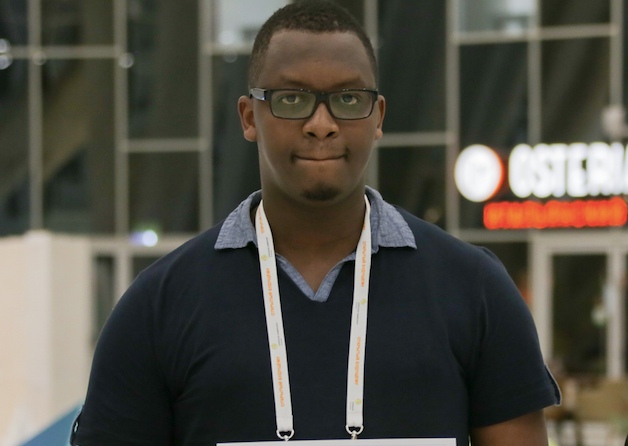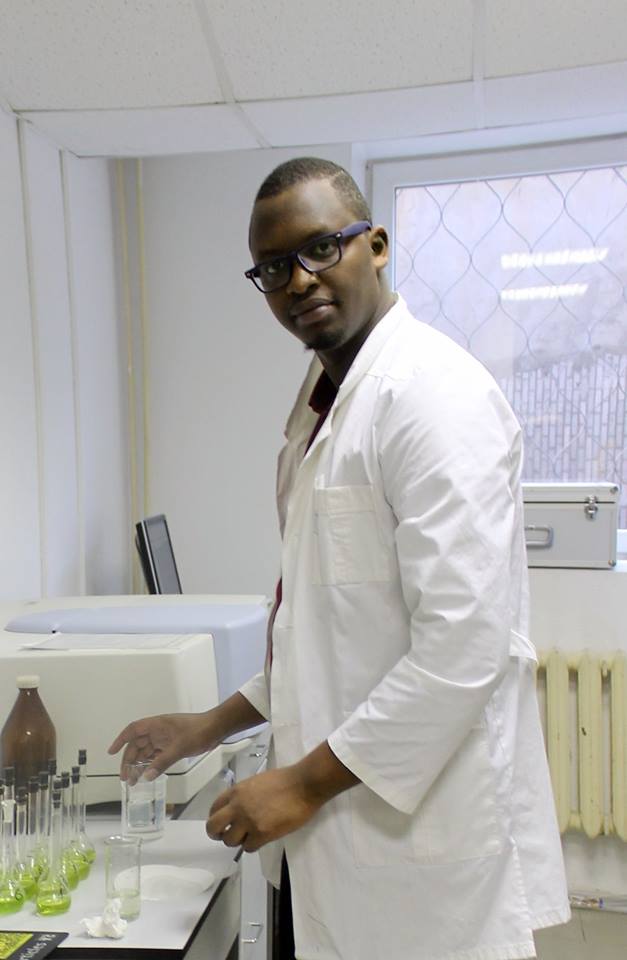From RUDN laboratories to the world without hunger
 I've enrolled in RUDN University due to the program of cooperation between Russia and Burundi in the field of education. I got high marks on the final exams, and the commission of the Ministry of Education offered me a place in RUDN. I decided not to miss this chance and agreed. This decision was approved by my parents. My uncle and several of my friends studied in Russia and told me a lot of good things about it. I was familiar with Moscow in absentia, with the process of learning and leisure options there and, of course with unusual weather for Africans. I stocked up with warm clothes in advance and hopped up to Moscow.
I've enrolled in RUDN University due to the program of cooperation between Russia and Burundi in the field of education. I got high marks on the final exams, and the commission of the Ministry of Education offered me a place in RUDN. I decided not to miss this chance and agreed. This decision was approved by my parents. My uncle and several of my friends studied in Russia and told me a lot of good things about it. I was familiar with Moscow in absentia, with the process of learning and leisure options there and, of course with unusual weather for Africans. I stocked up with warm clothes in advance and hopped up to Moscow.
I did not know Russian, but it wasn't a problem. There are many students from Burundi in RUDN, at first they helped me in everything: they showed me the residence hall, clinic, introduced to the local order.
I immediately liked the university. In our country, there are about a hundred people usually present at lectures in higher education institutions, and here there are mainly about 30–40 people. This allows the teacher to fully control the audience and, if necessary, pay individual attention to students. Also, the university gave me the opportunity to participate in interesting events. For example, I went to the intellectual property competition in St. Petersburg, where I spoke in the category “Intellectual Property in Agriculture” and represented the work on the protection of breeding achievements. My project took second place. I am very proud of it.
In the third year, I began to study genetics. It fascinated me from the start, I finally decided on my specialization and chose a supervisor, with whom we work together until now. In addition to scientific work in the research degree, one needs to undergo teaching practice. At first, it was difficult, but I knew that I needed this experience. It is not enough to have a knowledge, you need to be able to pass it on to others. I spend almost all the time in the lab. In two years I'll have to defend my thesis. I'm confident that I like what I do.
Currently, I'm conducting research in the field of plant genetics and molecular biology: I study the polymorphism of genes involved in the biosynthesis of biologically active substances (BAS).
These are chemical substances necessary for the maintenance of vital activity of living organisms: alkaloids, hormones, vitamins, microelements, biogenic amines, neurotransmitters, etc., most of which are contained in food. I study how they work at the molecular level, and pass on information to breeders who, according to the results of my research, derive new cultures. As for the practical significance of my work, its result will increase the quality level of products consumed by people. For example, vegetable biologically active substances with antioxidants and other biological properties have already proved their effectiveness against diabetes, cancer, heart problems, and other diseases. This is called functional nutrition, which is very popular today among people with a healthy lifestyle.
 I am very glad that my profession gives me the opportunity to come closer to the fulfillment of my dream to save the world from hunger. I am from Africa, and this issue is most acute there. Today, the problem of hunger can be solved by a more intelligent distribution of food, because humanity produces more than enough to feed everyone. But in the future, it will be impossible to live without new technologies, including genome editing. Increase in population is not the only reason, there is also a climate change, that makes the use of traditional methods ineffective. For example, one can fill the whole world with wheat plants to ensure that everyone has enough of it, but droughts and floods will most likely destroy a significant part of the crop. That means that we need to create varieties that are resistant to harsh climatic conditions and diseases. The genome editing technologies are needed for this.
I am very glad that my profession gives me the opportunity to come closer to the fulfillment of my dream to save the world from hunger. I am from Africa, and this issue is most acute there. Today, the problem of hunger can be solved by a more intelligent distribution of food, because humanity produces more than enough to feed everyone. But in the future, it will be impossible to live without new technologies, including genome editing. Increase in population is not the only reason, there is also a climate change, that makes the use of traditional methods ineffective. For example, one can fill the whole world with wheat plants to ensure that everyone has enough of it, but droughts and floods will most likely destroy a significant part of the crop. That means that we need to create varieties that are resistant to harsh climatic conditions and diseases. The genome editing technologies are needed for this.
Currently, there is an idea of restoring lost qualities during the introduction of plants, such as drought resistance and others. This is the so-called "Crop Rewilding", the restoration of wildlife. This could help, but the fact is that the efficiency of traditional technologies is lower than that of genome editing technology. Editing the genome works specifically on the plant.
Numerous studies are conducted on the safety of using such technologies, so I look forward to the permission to use them and hope that I will thereby help ensure the future food security of the population of the Earth.
I am not an idealist and I understand that it will not be easy to save the world from hunger. Fortunately, I have the opportunity to work on this global problem in the labs of RUDN every day.
I plan to return home and continue my research at the Agricultural Institute of Burundi after my graduation. The problem is that the direction of genetics and molecular biology is very poorly developed in my country. I am glad that RUDN is focused on the international market, so it is possible for me to compete there.
Products derived from microalgae represent a cutting-edge development in the field of bioeconomy. The potential of this biological resource was discussed at the international research seminar “Foundations for a Green Sustainable Energy”, part of the BRICS Network University’s thematic group on “Energy”. The event was organized by the Institute of Ecology at RUDN University.
Ambassadors of Russian education and science met at a conference in RUDN University to discuss how they can increase the visibility of Russian universities and research organizations in the world, and attract more international students in Russia.
The international scientific seminar hosted by RUDN Institute of Ecology “Experience of participation in student organizations as a way to form career skills” united scholarship recipients of the International Student Mobility Awards 2024 and Open Doors, along with members of the scientific student society “GreenLab” and the professional student association “Kostyor (Bonfire)” shared their projects focused on environmental protection.